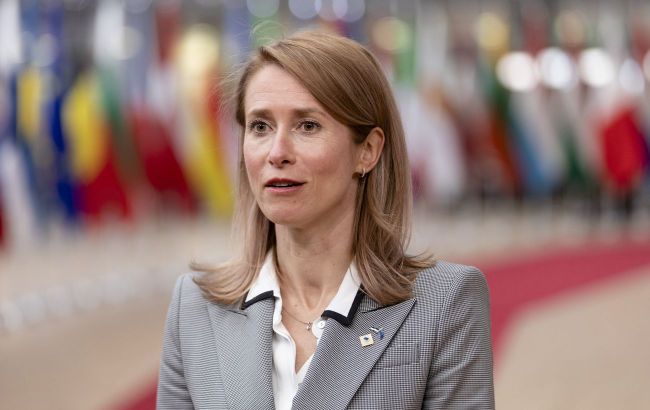PM of Estonia refused to guarantee that Estonian forces wouldn't be sent to Ukraine
 Photo: Prime Minister of Estonia Kaja Kallas (Getty Images)
Photo: Prime Minister of Estonia Kaja Kallas (Getty Images)
Estonian Prime Minister Kaja Kallas has refused to guarantee that the country's army will not be sent to Ukraine, stating that circumstances may change, according to ERR.
The head of the government made this statement on Wednesday, March 13, while responding to questions from members of the Riigikogu parliament during the government's question time. Participants of the session were discussing French President Emmanuel Macron's statement regarding the deployment of soldiers from EU countries to the territory of Ukraine.
Members of parliament repeatedly asked Kallas whether there are plans in Estonia to send soldiers to assist Kyiv. In response, the Prime Minister initially reiterated multiple times that nothing of the sort had been discussed and attempted to clarify the confusion in terminology.
"There has never been any talk of deploying ground troops. Nobody has talked about sending ground troops. In English, it's 'ground troops,' 'troops on the ground,' or 'soldiers on the ground' - these are soldiers in a specific country. Moreover, different countries do this; different countries send soldiers to help Ukrainians with training," she explained.
However, after members of the EKRE faction once again began demanding guarantees, Kallas emphasized that this decision would not be hers to make.
"To send soldiers outside of Estonia, a mandate from the Riigikogu is needed, so you will be able to decide this issue yourselves. Just like when we sent soldiers on various missions, a mandate from the Riigikogu is required. I cannot decide this on my own. This issue will not pass by you," said Kallas.
The conservatives demanded assurances from the Prime Minister that the Estonian Defense Forces would not intervene in military actions in Ukraine. However, the Prime Minister did not provide any guarantees.
"I do not make such promises because circumstances can change. By your interpretation, it seems that anything could be considered an intervention. Our military assistance to Ukraine could also be perceived by Russia as intervention because we very much want Ukraine to win, we very much want Russia to lose and return to its borders. Because we are doing everything to ensure Ukraine's victory. We have clearly chosen the side, and that side is Ukraine, because Russia is a direct threat to us," Kallas noted.
Deployment of foreign troops to Ukraine
At the end of February, French President Emmanuel Macron did not rule out the possibility of NATO deploying troops to assist Ukraine. However, there was no consensus at that time.
Later, Macron clarified that French troops could be sent to Ukraine in the event of a renewed Russian advance towards Kyiv or Odesa.
A number of NATO countries opposed this idea, including Germany, Czechia, Bulgaria, Poland, Spain, and Italy. However, there are countries willing to consider such a possibility, including Lithuania, Latvia, and Estonia.
Kaja Kallas supported Macron's idea and stated that the readiness to send troops to Ukraine is a signal to the Russian dictator Vladimir Putin.

